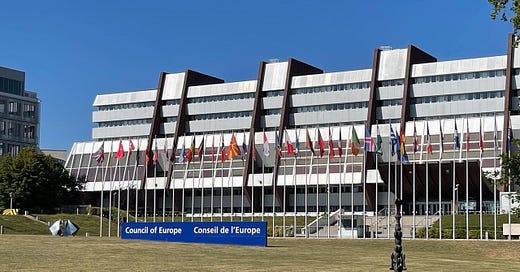European Council, Council of the EU, and Council of Europe: what difference?
So that, once and for all, you won't have to ask yourself the question ever again.
It has become some kind of joke, or meme, perhaps even a right of passage for young EU professionals: being able to distinguish from the three “Councils” Europe has.
Today, we answer the question once and for all. What the European Council, Council of the EU and Council of Europe do, are, and how not to mistake one for the others?
Become an EU politics and policy expert. Don’t miss any important updates. Register to The Beubble.

Council of Europe: nothing to do with the EU
The Council of Europe is an international organisation that has little to do with the European Union. It gathers 46 members, including, the states of the European Union, as well as Turkey or Ukraine, for instance.
The objectives of the Council of Europe are to promote democracy and rule of law and defend human rights. The Council of Europe also contributed to the establishment of norms, charters, and standards aiming at facilitating cooperation among its members.
The Council of Europe recently made the news over the war in Ukraine. Russia being a member of the assembly, it was decided to kick the country out after its invasion of Ukraine, and also a member of the Council of Europe.
The Council of Europe seats in Strasbourg, France.
Council of the European Union: a legislator
The Council of the European Union is composed of the ministers of national governments of the EU member states. They are divided into committees, each around a specific focus (general affairs, economic affairs, justice, environment, etc.).
The Council of the European Union (sometimes shorten into “the Council”) is a co-legislator of the European Union, alongside the European Parliament. If the Parliament represents the citizens of the Union and is the EU’s lower chamber, the Council can be considered the EU’s higher chamber, since it represents national governments.
The Council has a rotating presidency. Every six months, a new country chairs the discussions of the committee and the administration of the institution (agenda setting, budget administration). In the first half, Sweden chairs the Council of the European Union. Spain will take this responsibility from summer 2023 until 31 December.

European Council: EU leaders stir the Union
The European Council is a gathering of the head of state and governments of the 27 members of the European Union. It also includes the President of the European Commission and the EU’s High Representative for Foreign Affairs.
The European Council is tasked to define the general orientation of the European Union. Its meetings conclude with a report to the European Parliament and regularly invite the European Commission to submit propositions following its discussions.
The European Council is chaired by a President, elected by a mandate of 2,5 years, renewable once, whose role is to facilitate consensus. The current President of the European Council is Charles Michel.
The European Council seats right next to the Council of the European Union in Brussels (which doesn’t help make the distinction any easier), opposite the Berlaymont, the seat of the European Commission.
Alexandre Météreau is the author of The Beubble, and a specialist in European policies and politics. Discover more about Alexandre at alexandre-metereau.eu.
Don’t forget to subscribe to The Beubble.






